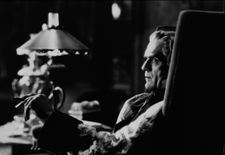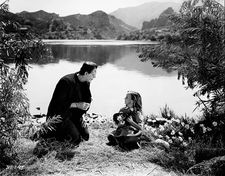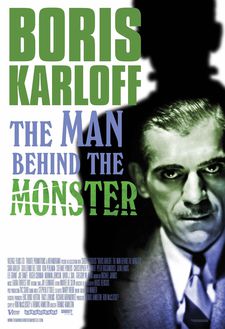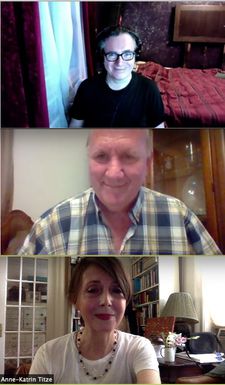 |
| Boris Karloff in Robert Wise’s The Body Snatcher, adapted from Robert Louis Stevenson’s novel by Philip MacDonald, and produced by Val Lewton |
Thomas Hamilton’s Boris Karloff: The Man Behind The Monster, co-written and produced with Ron MacCloskey, has terrific on-camera interviews with Guillermo Del Toro, John Landis, Peter Bogdanovich, Roger Corman, Stefanie Powers, Ron Perlman, Christopher Frayling, Kevin Brownlow, Boris’s daughter Sara Karloff, and a wonderful reading by the great Christopher Plummer of a Swinburne poem.
Who was the man whose name and face became synonymous with Mary Shelley’s most famous creation via James Whale’s 1931 movie version of Frankenstein? In this documentary we are taken on a fascinating excursion into one of the most iconic and disturbing film moments when an encounter with a friendly little girl turns deadly and audiences experience a combination of emotions rarely triggered in cinema. We hear Karloff talk about why he didn’t like the word horror and how The Mask of Fu Manchu had no cultural advisors whatsoever.
The slow opening of an eyelid more terrifying than a bag of CGI tricks, his Anglo-Indian heritage and the family background in Bombay, the disapproval of his brothers, touring in Canada, and career help from the likes of Lon Chaney, Lionel Barrymore and Howard Hawks are stops along the way to find out more about the iconic actor. How good an actor Karloff was becomes more and more obvious as we get to see his range and subtlety. Val Lewton, The Black Cat’s thrilling modernism and The Black Room’s three roles in one, his career renaissance on the Broadway stage and his resurrection on TV - the facets are many to the man who inspires Guillermo del Toro to gush about his early Karloff fan conversion: “I saw my messiah!”
From London, Thomas Hamilton and from Edison, New Jersey, Ron MacCloskey joined me on Zoom for an in-depth conversation on Boris Karloff: The Man Behind the Monster.
Anne-Katrin Titze: Hello Ron!
Ron MacCloskey: You sound like you have an accent that is not New York.
AKT: I’ve been here for a long time.
RMC: You sound a little bit like Audrey Hepburn.
AKT: Thank you.
 |
| Thomas Hamilton on Boris Karloff in Roy William Neill’s The Black Room: “He’s both good and evil and you see him as the evil version playing the good guy …” |
RMC: You’re welcome. You can’t go wrong with Audrey Hepburn, right?
AKT: No, you cannot. Hi Thomas!
Thomas Hamilton: Hi Anne-Katrin!
AKT: Very early on, you have a quote by Guillermo Del Toro in your film about Black Sabbath. He says it’s this “grandfather who comes back to vampirize the family.” That’s very much what you have in your title The Man behind the Monster.
TH: Yes.
AKT: Boris Karloff, with the warm voice and the threatening quality on the other hand, very much exemplifies Freud’s The Uncanny. Is it the two sides of Boris Karloff you wanted to capture, the one that is so warm and the other that is so scary?
TH: Yes, we very much wanted to show that and show the way as an actor he could completely change in front of the camera. You can see there are moments during the film where we show clips. I particularly like the sequence with The Black Room where he’s both good and evil and you see him as the evil version playing the good guy, but it’s not quite the same. It’s a fake goodness. I love that moment. It’s wonderful acting. It’s not something that you expect to see in horror films, that quality of acting. Yes, it’s the two sides of Karloff and I’m glad you saw that.
 |
| Olivia de Havilland plays twins Ruth and Terry in Robert Siodmak’s The Dark Mirror. |
AKT: It’s interesting, the moment you just mentioned reminded me of Olivia de Havilland’s performance, where she plays twins.
TH: Oh, yes.
AKT: It’s Robert Siodmak’s The Dark Mirror from 1949. She has that same quality there.
TH: The Dark Mirror, yes.
AKT: I connected this also with Karloff’s horror of being on the TV show, This Is Your Life, as if there were a secret or more to uncover. He had a lot of wives; there is a bit of Bluebeard maybe?
TH: He had five wives. I don’t think he murdered any of them, but he had five wives. He was stricken when he realised that he was the guest on This Is Your Life. The funny thing is, he had actually been to many This Is Your Lives before that, where he wasn’t the guest and just sitting there in the audience. You can even see one on YouTube from a couple of years earlier, where Ralph Edwards actually starts talking to him and says “You’re not the guest this week.” And Boris goes “Thank goodness!” He was very private and he did not want his life paraded in front of the cameras, because he didn’t know what they were going to talk about. And as you know from the film, he had a few things from his past that he felt worried about airing.
 |
| Thomas Hamilton on Boris Karloff with Marilyn Harris in James Whale’s Frankenstein: “He didn’t really want to throw this child in the lake.” |
AKT: They didn’t have any of his brothers on the show, did they?
TH: No. I think he had one brother still alive at that time. An older brother, funnily enough, living in England. They didn’t have any family members apart from Sara and Evie.
RMC: If I can jump in and go back to your first point about the two sides, you know, so many actors have done twins in films, but his performance, I think, is just remarkable. That’s one of the things I’m so happy that this documentary shows, that he was so good an actor. I agree with what one of the commentators says, that he should have been nominated for an Oscar. Same thing with The Body Snatcher, just a wonderful, great performance. He really deserved more accolades during his own lifetime.
AKT: Del Toro speaks about the different freedom Karloff had near the end of his career - “his majesty, his gravity, and a little bit of madness,” he says.
TH: That’s one of my favorite quotes.
AKT: He is a perfect commentator.
RMC: I have to tell you, Guillermo Del Toro is so eloquent in this and says so much from his heart. And Guillermo is so relevant today, so important, that when he says something like that, I hope that drives thousands of people to find out about this Boris Karloff guy that Guillermo just idolised.
 |
| Ron MacCloskey on Boris Karloff and Bela Lugosi in Edgar G Ulmer’s The Black Cat: “We show clips from two films that are not necessarily horror, but disturbing. One is The Black Cat …” |
AKT: I do think that a lot of young people have at least a vague idea of who he is, more so than of some of his contemporaries, because he became synonymous with Frankenstein’s monster. Even Bela Lugosi and Dracula are on a different sphere. I like very much how you go into depth with the scene with the little girl. I saw an earlier version of your film where you didn’t have the talking heads in front of the watery background, but I really like that, it’s funny. Please talk a bit about that moment!
TH: It’s a powerful scene in the original film, in Frankenstein. It’s powerful in that it tells us a lot about Karloff as an actor and as a man. How he related to Marilyn Harris, who played the little girl, and also as a human being, he didn’t really want to throw this child in the lake. He didn’t think it was right for the character at that point and he argued with James Whale. I felt - how do you show this? And one of the things I wanted to do was … If you have seen Frankenstein 20, 30 years ago, they used to show it without the sequence of the little girl being thrown in the water. As he reached forward they would cut. I wanted to take the audience on a little journey through what actually happened with that scene. I felt it was very important to spend some time on it and show how audiences originally saw it, what was the reaction, what did they do, and how Karloff felt about it. What made the scene special to me was what my composer Laura Forrest Hay does musically under that. I think it’s a very powerful bit of music that she composed there. I wanted audiences to really experience the raw emotion, not a 90-year-old scene that you’re watching.
 |
| Ron MacCloskey on Charles Starrett, Myrna Loy, Boris Karloff in Charles Brabin and Charles Vidor’s The Mask Of Fu Manchu: “… and the other is The Mask of Fu Manchu.” |
RMC: Someone asked me about what did I learn making this film. No surprise, I did learn a lot. One of the things that I learned was that scene. I mean, the only thing I had heard was there was this scene that was cut out and put back in. But there’s a whole story behind it and it’s so wonderful that we were able to tell that story so people now know the difference. There was another scene also cut out of the film where Henry Frankenstein says “Now I know what it feels like to be God.” And the religious movement said no, no, no, no, we can’t have that. So that was cut.
AKT: It’s so interesting what it tells us about censorship. Sometimes by taking something out, trying to protect audiences, you do the opposite. When you only see the girl being carried, the rape association is there, which isn’t there otherwise.
TH: Yes.
AKT: Karloff wasn’t invited to any events around the premiere of the film, another startling point. He is at the center of the film and nobody even bothered to have him come.
TH: Because he wasn’t the star. He was a supporting actor, he’d been given a nice part, that’s how Universal looked upon it. It was Colin Clive and Mae Clarke, the two stars and James Whale, of course, those were the people who were invited. And Boris, as David Skal says, Boris wasn’t particularly troubled by that. He was used to it. That’s how it was for him ever since he arrived in Hollywood, but not for much longer.
 |
| In Karl Freund’s The Mummy, Boris Karloff’s slow opening of an eyelid is more terrifying than a bag of CGI tricks. |
AKT: You show a photo of Karloff with five dogs? Did he have five dogs?
TH: He had many dogs. Ron, tell Anne-Katrin about the dogs!
RMC: He had almost a farm at his home. I mean, he had pigs, he had chickens. The original property was several acres, so he was able to have all those things. And he also loved to garden. It’s unusual. You know, Boris Karloff digging up and planting flowers. No, he loved animals very very much, in fact, in the movie we had talked about before, in The Black Room, it’s the dogs that can tell the difference between the evil and the good guy. I think he actually got bitten in that film from one of the dogs. But he loved animals and animals loved him. He had two cocker spaniels; one was called Scotch and the other Water.
AKT: That says a lot. I think my favorite moment you have of Karloff speaking is from 1934 The Black Cat, apropos animals. He says he has an “intense all-consuming horror of cat-th,” with that wonderful lisp of his. It must have been difficult to choose which clips to include?
TH: Yeah, that’s a very good question. First of all you have to try and find clips that fit with what is being said and what you want to tell the audience about performance. I love in that how his eyes just slide across to Bela Lugosi when he is saying that line. It’s cat-like, it’s feline. I very much enjoy picking the clips that are the most interesting, not necessarily the most famous. The ones where you see what he could do with a moment. It’s a very complicated process.
RMC: We show clips from two films that are not necessarily horror, but disturbing. One is The Black Cat and the other is The Mask Of Fu Manchu. And these were very disturbing movies at the time when they came out.
 |
| Ron MacCloskey on Von the Dog with Boris Karloff and Katherine DeMille in The Black Room: “It’s the dogs that can tell the difference between the evil and the good guy.” |
TH: The wonderful thing about The Mask of Fu Manchu was that we have all this commentary from Boris himself about the making of it. It was great to have him narrate that portion. That was an opportunity I couldn’t miss.
AKT: And as somebody says in your film, it was one of the most racist films made in Hollywood in the 1930s with nobody Chinese consulting on anything. But there is beautiful Myrna Loy and that was enough. The Isle of the Dead comes up. Do you feel that the Arnold Böcklin painting comes alive for you too?
TH: I love The Isle Of The Dead, it’s one of my favourite films. I would have liked to have featured more of it but we were kind of pressed for time. That film brings that painting to life. I love what Christopher Frayling has to say about that. I think the moment illustrates Val Lewton and how literate and conscious of art he was in making those films. I thought it was important to show that he was a very different kind of producer.
AKT: You must have seen Kent Jones’ film about Val Lewton? I like the quote by Karloff you use in this context, about how Lewton saved him.
TH: Yeah, he saved his soul.
RMC: When Val Lewton was told that he could start his own unit and do films, the whole purpose was to not do the films Universal Studios were doing. He wanted to get away from that. Then when he heard they wanted Karloff to be in one of his films, his immediate reaction was no, I don’t want that, that’s what I’m getting away from! But they met each other and found out that they enjoyed each other and he realized what a good actor Karloff was. They made some wonderful films. To me the best was The Body Snatcher, directed by Robert Wise. Wise had an amazing career, he did so many films. That was his first film.
AKT: You have Christopher Plummer in a very plum moment, very short, but couldn’t be any better. How did he come onboard?
 |
| Boris Karloff: The Man Behind The Monster poster |
TH: Well, Christopher Plummer we wanted from the beginning. I tried to get as many people that worked with Boris as possible. Both Ron and I were looking to get those people. It happened that Christopher Plummer was in Toronto making a special appearance at a retrospective. And we found out where he was staying from his agent, who said he was very busy. We said, look, what if we book ourselves in the same hotel? If we’re on the same floor, all he has to do is walk down the corridor into our room and we have everything set up and film him. And that was exactly how Christopher Plummer walked into our room at 3pm and we did the interview in 15 minutes. He was wonderful, so gracious and so lovely. At the end he said “I’m really glad this is being done and I’m glad that you’re doing it.” I didn’t keep it in the film because it feels like blowing trumpets. But Christopher Plummer was in the film because of The Lark, which was the play he had such success with on Broadway in 1956. Ron and I are trying to do an expanded version of the film with some of that material in it that we weren’t able to use here in the theatrical version.
RMC: I’d also put Christopher Plummer in the role of possibly taking off the mantle of Karloff, as far as respect and his work that he did. He not only did film and television, he also went back to the stage. That’s exactly what Boris did. Christopher Plummer performed with him on television as well with Lee Grant. I’m so happy we were able to include him before he passed away.
AKT: The stage part is interesting, how he performed in Arsenic And Old Lace but then didn’t play the part in the movie version, but then again on TV.
RMC: Many people may not realize this, but it proves to me what type of man he was. When they first approached him to do Arsenic and Old Lace on Broadway, he said more or less “I don’t think I’m worthy to be on Broadway. I’m a film actor.” They had to convince him to do it. He was nervous and yet he did it, it was successful and he went back to his dressing room and said, “You know what? I think I’ve finally made it. I’ve succeeded on the stage and on Broadway.”
AKT: He’s a fantastic storyteller. Have you ever heard a better version of The Appointment in Samarra? I don’t think so.
TH: Absolutely not! He is wonderful in that. One of the things we would have loved to explore is he did a lot of radio work, a lot of storytelling on records. That voice is so magical. But it’s not something you can easily put in a documentary. He had that wonderful voice, you can hear it in The Grinch as well.
RMC: He had an enormous recording career. What few people realize, he won a Grammy for doing the narration for How the Grinch Stole Christmas. He did Rip Van Winkle, Peter and the Wolf, just great recordings.
AKT: Also Peter Pan. His voice had the qualities great tales have. It has to be at least a bit disturbing and comforting at the same time. You brought that across brilliantly.
Boris Karloff: The Man Behind The Monster is in cinemas in the US.






















